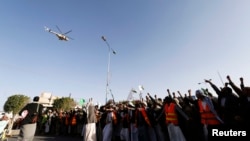President Barack Obama said U.S. counterterrorism operations in Yemen continue despite last week’s resignation of President Abd Rabbuh Mansour Hadi amid pressure from Shiite Houthi militiamen, who overran the presidential palace last week. Two U.S. lawmakers Sunday suggested more U.S. Special Operations troops may be needed in countries battling extremists.
During a Sunday joint news briefing with Indian Prime Minister Narendra Modi in New Delhi, Obama discounted media reports that U.S. counterterrorism operations aimed primarily at al-Qaida in the Arabian Peninsula (AQAP) had been curtailed in Yemen.
"I saw some news reports that suggested somehow that counterterrorism activity had been suspended. That is not accurate. We continue to go after high-value targets inside of Yemen and we will continue to maintain the pressure that’s required to keep the American people safe," said Obama.
The president said the United States will continue to pursue a strategy of partnering and sharing intelligence with governments in Yemen and Iraq rather than resorting to what he called a massive U.S. military deployment in perpetuity. He said that would be an unsustainable strategy and would create more problems than it would solve.
Appearing Sunday on the CBS program “Face the Nation,” Obama’s chief of staff, Denis McDonough, said the administration was not surprised by Thursday’s resignation of Yemen’s president.
"We knew this was an ongoing challenge in the course of the last several months. That’s why we’ve been pressing on all the actors to take important steps to address the situation. We’re continuing to do that today," said McDonough.
McDonough said governance in Yemen has always been difficult, and that the United States will continue to press the actors on the ground to make decisions transparently pursuant to a political agreement to remain on the offense against AQAP. He added that AQAP hides in what he called dark, tumultuous situations to ply their trade.
Appearing on the same program, the chairman of the Senate Armed Services Committee, John McCain, said the president and his White House chief of staff have lost touch with reality in pursuing their Mideast policy.
"Iran is on the march throughout. In Yemen, it’s not AQAP who’ve taken over the government, it’s the Houthis who, guess what, are backed and supported by the Iranians. The Iranians now are either dominant or extremely influential in Iraq, Lebanon, Syria, [and] Yemen. They’re on the move in Bahrain, and they’re winning," said McCain.
McCain also said there is no strategy to effectively counter terrorists in the region and that it is time for more U.S. forces on the ground.
"It means forward air controllers, it means Special Forces, it means intelligence and it means other capabilities. And, for them to say we expect them (foreign governments) to do it on their own, they’re not doing it on their own and they’re losing," said McCain.
Also appearing on U.S. television, the ranking Democrat on the Senate Intelligence Committee, Diane Feinstein said the future of Yemen remains unknown.
"We know that the Houthis have said they will leave us alone and yet their slogan is ‘Death to America, Death to Israel.’ They have deposed the president, the military has separated off, and we have less than 300 Yemeni military guarding our embassy. So, I think there are a number of priorities. One is to see our people there are safe. The second is to take a good look at our policy with respect to Yemen," said Feinstein.
Feinstein also said more U.S. Special Forces will be needed, with a mission that goes beyond merely advising troops in the host country.
RAND Corporation senior political scientist and former army officer Rick Brennan warned U.S. foreign policy is in crisis, failing to adequately address what he calls the Sunni-Shiite civil war in the Middle East.
"There is no consistent effort on the part of this (US) government in terms of how we’re going to go about addressing this issue. On the one hand, you’ve got al-Qaida, al-Qaida/affiliated organizations. And, on the other, you have Iran and what Iran is doing is to sponsor unrest throughout the region, and the Houthis are just one example of the type of organizations that is training, organizing, funding, and while they are saying they are not involved in doing that, all the markers are there just as they were in providing support to the Shiite militia groups in Iraq, as well as the Assad regime in Syria," said Brennan.
Brennan agrees there needs to be more U.S. Special Forces in the region and a more robust intelligence-gathering effort that comes from capturing terror suspects. He said the 23 drone strikes against AQAP in Yemen over each of the past two years represent a “miniscule” response to what the group is doing. Brennan warned that a more dangerous period in the Middle East than at any time in his life was beginning.
The U.N. Security Council is to hold a closed-door meeting Monday on the Yemen crisis.




